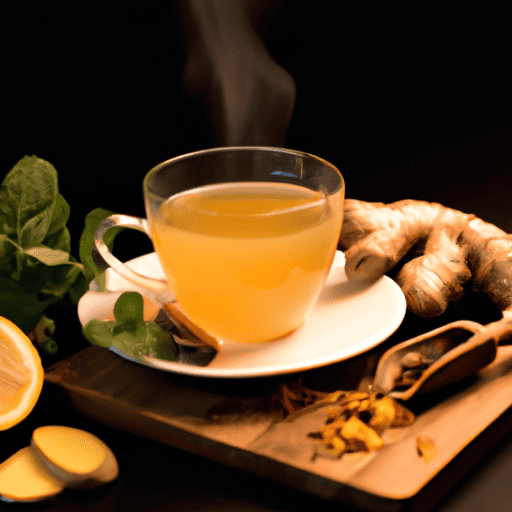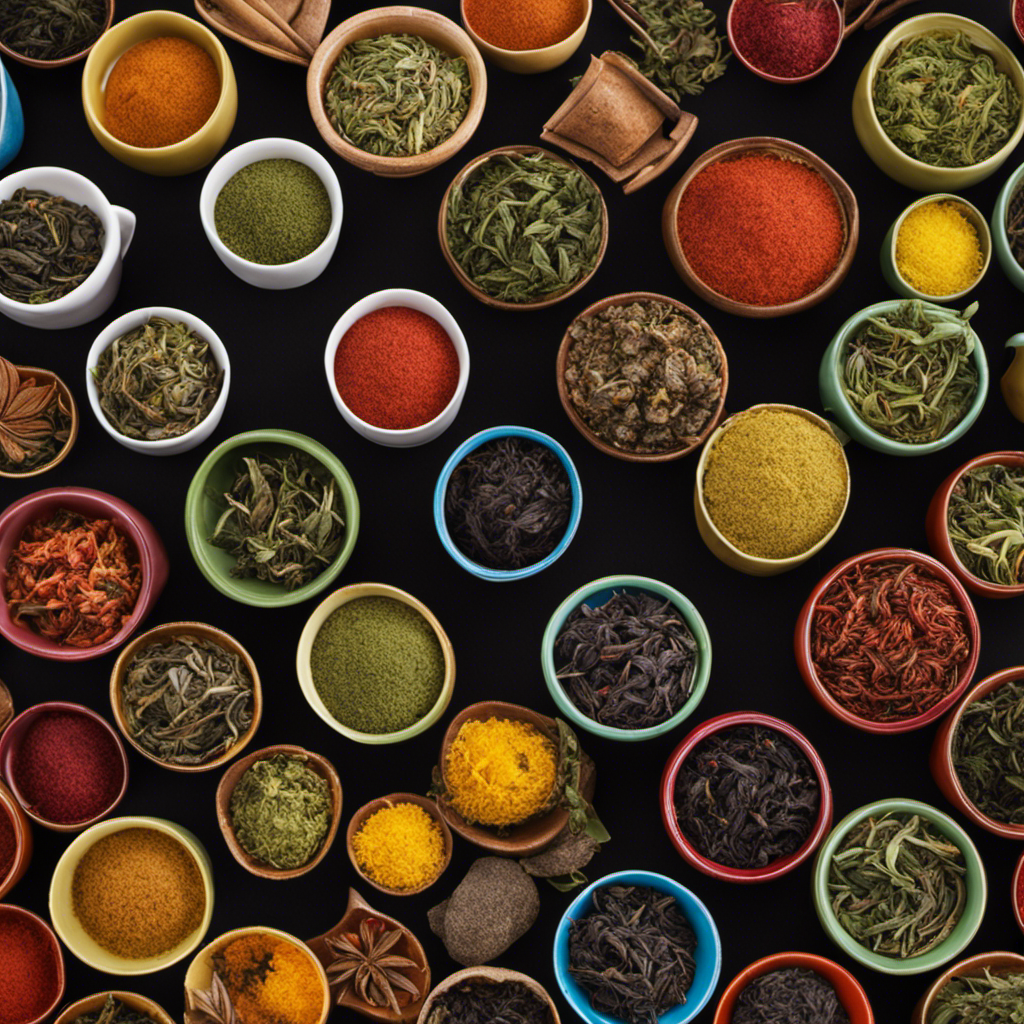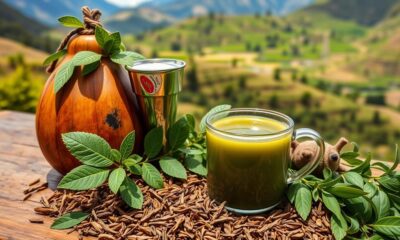Turmeric Tea
How To Make Ginger Turmeric Tea At Home

I can still vividly remember the first time I tasted ginger turmeric tea. It was during a particularly cold winter day and I was feeling under the weather. My friend, who is a nutritionist, recommended that I try this tea to help boost my immune system and fight off the cold.
As soon as I took a sip, it felt like a warm hug on a chilly day – comforting and rejuvenating all at once. Ginger turmeric tea has been used for centuries in traditional medicine to treat various ailments. This tea is not only delicious but also packed with health benefits such as reducing inflammation, improving digestion, boosting immunity, and promoting healthy skin.
In this article, I will share with you how to make this wonderful brew in the comfort of your own home using easily accessible ingredients.
Key Takeaways
- Ginger turmeric tea has numerous health benefits, including boosting immunity, reducing inflammation, improving digestion, and promoting healthy skin.
- When selecting and preparing ingredients, it is important to choose firm pieces with smooth skin and no mold or wrinkles and to use filtered water to remove impurities and minerals.
- To brew the tea, add sliced ginger and turmeric root to boiling water and simmer for 10 minutes before straining and adding optional lemon or honey for sweetness.
- Leftover tea can be stored in an airtight container in the fridge for 3-4 days and can be enjoyed hot or cold with added flavors such as lemon or mint.
Benefits of Ginger Turmeric Tea
You’re gonna love how ginger turmeric tea not only tastes delicious but also offers a plethora of health benefits to help improve your overall wellbeing.
Health benefits associated with ginger turmeric tea are numerous and have been backed by scientific research. For starters, ginger helps soothe nausea and digestive issues while turmeric has powerful anti-inflammatory properties that can aid in reducing pain and swelling throughout the body.
Moreover, both ginger and turmeric contain antioxidants that protect our cells from damage caused by free radicals in our environment. These antioxidants play an important role in preventing chronic diseases such as cancer, heart disease, and Alzheimer’s disease.
With all these health benefits combined, it’s no wonder why so many people are turning to this herbal tea for its medicinal properties.
Now let’s move on to gathering the ingredients needed for making this amazing tea!
Gather Ingredients
So, to make a delicious and healthful ginger turmeric tea at home, I need four key ingredients: fresh ginger root, fresh turmeric root, black pepper, and honey (optional).
Firstly, I’ll gather some fresh ginger root from the market. Secondly, I’ll get some fresh turmeric root to add its anti-inflammatory benefits. And thirdly, I’ll include a pinch of black pepper for better absorption of curcumin in turmeric. Lastly, if I want to sweeten my tea naturally, then adding honey is a great option.
Fresh ginger root
Don’t be shy, grab that knobby ginger root and get ready for a flavor explosion in your homemade turmeric tea! Not only is fresh ginger root a key ingredient in this recipe, but it can also be used in many other delicious dishes.
The pungent and spicy taste of ginger adds depth to stir-fries, curries, marinades, dressings, and even baked goods. In addition to its culinary uses, ginger has been praised for its medicinal properties for centuries.
It’s known to reduce inflammation, relieve nausea and vomiting, improve digestion, boost the immune system, and alleviate pain. Combined with turmeric’s anti-inflammatory effects and antioxidant power, this tea is not only tasty but also a great way to support your health.
So let’s peel that ginger and move on to the next step – fresh turmeric root!
Fresh turmeric root
To truly experience the full potential of this recipe, it’s essential to include fresh turmeric root in your ingredients list. Using fresh turmeric will give you a more vibrant and intense flavor compared to the dried powder version. Plus, it adds an earthy aroma that can uplift your senses as you sip on your ginger turmeric tea.
Aside from adding depth to your cuppa, using fresh turmeric also has health benefits for the skin. This superfood contains curcumin which is known for its anti-inflammatory properties that can help reduce redness and irritation. It also has antioxidants that fight against free radicals which can damage our skin cells and cause premature aging. So not only does it taste great, but it also promotes healthy-looking skin!
Moving on to the next ingredient – black pepper – let me show you how this small spice can further enhance the benefits of this tea.
Black pepper
Adding black pepper to your ginger turmeric blend can enhance the health benefits of your tea. Black pepper contains piperine, a compound that helps in the absorption of curcumin – the active ingredient in turmeric. According to a study published in Planta Medica, adding just a pinch of black pepper to your ginger turmeric tea can boost the absorption of curcumin by up to 2000%.
Apart from aiding in the absorption of curcumin, black pepper also has its own health benefits. It’s rich in antioxidants and has anti-inflammatory properties. Adding black pepper to your ginger turmeric tea not only improves its taste but also enhances its therapeutic effects.
With such impressive health benefits, it’s no wonder that black pepper is often used as an essential ingredient in making ginger turmeric tea.
Moving on to the next section, if you prefer your tea sweetened, honey is a great optional addition.
Honey (optional)
If you’re looking to add a touch of sweetness to your ginger turmeric blend, honey can be a great optional addition that not only enhances the taste but also provides its own health benefits. Here are some of the reasons why using honey to sweeten ginger turmeric tea is a great idea:
- Honey has antibacterial properties that can help soothe sore throats and coughs.
- It contains antioxidants that can help protect your body from free radicals and reduce inflammation.
- Honey has been shown to have a positive impact on gut health by promoting the growth of beneficial bacteria in the digestive system.
- It is a natural source of energy and can provide a quick boost when you need it.
Adding honey to your ginger turmeric tea not only makes it more delicious but also provides added health benefits.
Now that we’ve talked about how honey can enhance our tea, let’s move on to preparing our ingredients for brewing our perfect cup!
Prepare Ingredients
Before you start, gather all the necessary ingredients for the ginger turmeric tea. When selecting fresh ginger and turmeric, look for pieces that are firm with smooth skin and no signs of mold or wrinkles. It’s best to choose organic if possible to avoid any pesticides or chemicals that may be present on conventionally grown produce.
Filtered water is also important for brewing tea as it removes any impurities and minerals that can affect the taste of your tea. Using tap water may result in a metallic or chlorine taste, which can ruin the flavor of your drink.
Once you’ve gathered your ingredients, it’s time to move onto boiling water. Bring a pot of filtered water to a boil and add in sliced ginger and turmeric root. Let the mixture simmer for about 10 minutes before straining out the solids. This will create a strong base for your ginger turmeric tea, allowing all the flavors to fully infuse into the liquid.
Boil Water
So, now that I’ve got all my ingredients ready, it’s time to boil some water. To ensure the quality taste and health benefits of the tea, I always use filtered water.
Then, I heat up a pot or kettle on the stove until the water reaches boiling point.
Use filtered water
For the best tasting ginger turmeric tea, you should use filtered water. Trust me, your taste buds will thank you!
There are a few reasons why using filtered water is important when making tea:
-
Removing impurities: Tap water can contain impurities such as chlorine, lead or other chemicals that can affect the flavor of your tea. Using a filter removes these impurities and results in a purer tasting cup of tea.
-
Better aroma: Water with a strong odor can impact the aroma of your tea. Filtering out any unpleasant odors from tap water enhances the overall experience of drinking your tea.
-
Health benefits: Drinking clean filtered water has numerous health benefits, including better digestion and immune system support.
-
Easy to do at home: There are many ways to improve water filtration at home, such as using a faucet-mounted filter or purchasing a pitcher with built-in filtration.
Now that we know how important it is to use filtered water for our ginger turmeric tea, let’s move on to boiling it in either a pot or kettle.
Boil in a pot or kettle
To boil the water for your delicious ginger turmeric tea, simply fill a pot or kettle with filtered water and place it on the stove or heating element. Boiling water is essential in making tea, as it helps to extract the flavors and nutrients from the ingredients.
However, not all boiling methods are created equal. When it comes to boiling water for tea, there are different methods you can use such as stovetop, microwave, or electric kettle. Each method has its own pros and cons in terms of speed, convenience, and flavor. For example, stovetop boiling can take longer than using an electric kettle, but it may be better for certain types of teas that require a slower heating process.
Additionally, some pots may be more suitable than others when boiling tea due to their material and size. Now that we know how to boil our water properly for this delicious ginger turmeric tea, let’s move onto adding our ingredients to enhance its flavor!
Add Ingredients to Water
First, you’ll need to chop up some fresh ginger and turmeric before adding them to the boiling water. Don’t worry if you don’t have fresh ingredients on hand, ground ginger and turmeric will work just as well! Here’s how I like to prepare my ginger turmeric tea:
For a spicier flavor, use more ginger. Use less turmeric if you prefer a milder taste. Add a squeeze of lemon or honey for added sweetness. Experiment with different brewing methods such as steeping in a French press or using a tea infuser for unique flavor variations.
Once the ingredients are chopped and ready, add them to the boiling water and let simmer for about 10-15 minutes. This allows all of the flavors to meld together and create that comforting warmth we all love in our teas.
Simmer the Tea
Now that we have added all the ingredients to the water, it’s time to simmer the tea. This is where the magic happens! Simmering allows all the flavors and nutrients from ginger and turmeric to infuse into the water. The longer you simmer, the stronger and more potent your tea will be. I recommend simmering for at least 15-20 minutes, but if you have time, let it go for up to an hour.
Simmering also has some additional benefits besides enhancing flavor. It helps break down tough fibers in ginger and turmeric, making them easier to digest and absorb by our bodies. Moreover, long-simmered teas are known for their therapeutic properties as they extract more of the beneficial compounds from herbs. You can even add other herbs like cinnamon or black pepper during this step to further enhance its health benefits. So sit back, relax and let your tea simmer away on low heat while enjoying its aroma filling up your kitchen.
As we wait for our tea to finish simmering, let’s prepare ourselves for the next step – straining it!
Strain the Tea
Now it’s time to strain the tea. I usually use a fine mesh strainer or cheesecloth to remove any solids from the liquid.
It’s important to discard those solids so that you’re left with a smooth and delicious cup of ginger turmeric tea.
Use a fine mesh strainer or cheesecloth
To ensure a smooth and enjoyable cup of ginger turmeric tea, I highly recommend straining the mixture using a fine mesh strainer or cheesecloth. While some may choose to use tea infusers or alternative strainers, I find that using a fine mesh strainer or cheesecloth is the most effective way to remove any excess solids from the mixture.
Using a fine mesh strainer or cheesecloth not only removes any unwanted solids but also ensures that the tea has a smooth texture and is easy to drink. It’s important to note that different variations of ginger turmeric tea can result in varying amounts of solids, so it’s best to adjust your straining method accordingly. Once you’ve strained out any solids, you’re ready for the next step: discarding them.
Discard solids
Once you’ve strained the mixture through a fine mesh strainer or cheesecloth, simply toss out any remaining solids to ensure a smooth and delicious cup of this healthy drink. Although some may wonder whether there are ways to reuse these solids, discarding them is actually the best option as they’ve already released their beneficial properties into the tea.
Discarding the solids in ginger turmeric tea not only enhances its taste but also maximizes its health benefits. Ginger and turmeric contain potent antioxidants and anti-inflammatory compounds that can help alleviate pain, reduce inflammation, boost immunity, and improve digestion. By removing the solids, you eliminate any potential grittiness or bitterness from your tea while ensuring that all of these powerful nutrients make it into your cup.
With your smooth mixture ready, add honey (optional) for extra sweetness and enjoy!
Add Honey (Optional)
If you’re looking for a healthier alternative to sugar, try adding a drizzle of honey to your ginger turmeric tea. Not only does it sweeten the tea without adding extra calories, but honey also offers health benefits.
It has antimicrobial properties that can help soothe a sore throat and promote healing. In fact, using honey in other tea recipes is quite common because of its numerous health benefits. It contains antioxidants and anti-inflammatory compounds that can boost immunity and reduce inflammation in the body.
Adding honey to your ginger turmeric tea not only enhances its flavor but also provides additional health benefits. Now that we’ve added the honey, let’s move on to serving and enjoying our homemade ginger turmeric tea!
Serve and Enjoy
So now that I’ve added honey to my homemade ginger turmeric tea, it’s time to serve and enjoy!
I pour the fragrant golden liquid into a cup and inhale its comforting aroma.
This tea can be enjoyed hot or cold, depending on your preference.
Pour tea into a cup
Now pour the hot ginger turmeric tea into your favorite mug and savor every sip of its warm, soothing goodness. Before you take that first sip, here are a few things to keep in mind when serving and presenting your tea:
- Use a clear glass or mug to showcase the beautiful golden color of the tea.
- Add a slice of lemon or a sprig of fresh mint for added flavor and presentation.
- Place the teabag or loose leaves on a small dish next to the mug for easy removal without making a mess.
- Serve with some honey or agave nectar on the side for those who prefer their tea sweeter.
- Don’t forget to stir the tea before drinking to ensure that all the flavors are evenly distributed.
Enjoy hot or cold – it’s up to you!
In the next section, we’ll discuss how to store any leftover ginger turmeric tea so that you can enjoy it again later.
Enjoy hot or cold
Whether you prefer to sip on a steaming hot cup of this golden elixir or pour it over ice for a refreshing treat, let the flavors of ginger and turmeric dance on your taste buds with every sip.
To enjoy this tea hot, simply pour it into your favorite mug and savor the warm, spicy notes that fill your mouth. If you’re in the mood for something cooler, let the tea chill in the fridge for a few hours before serving over ice. This is perfect for those hot summer days when you want something refreshing to quench your thirst.
There are also creative ways to serve ginger turmeric tea if you want to mix things up a bit. For example, you could add a slice of lemon or lime to give it an extra zingy flavor. You can also sweeten it with honey or maple syrup if you have a sweet tooth. Another way to enjoy this tea is by making popsicles out of it – simply pour the cooled tea into popsicle molds and freeze until solid. These make for a healthy and delicious treat that both kids and adults will love!
Now that we know how to enjoy our ginger turmeric tea hot or cold, let’s move onto storing any leftovers for future use.
Store Leftovers
To keep your ginger turmeric tea fresh for longer, simply store the leftovers in an airtight container in the fridge. This is a great way to save time and ensure that you have a healthy and delicious drink on hand whenever you need it. Just make sure to use the tea within 3-4 days of making it, as the flavors will start to deteriorate after this time.
When storing your ginger turmeric tea, be sure to label the container with the date you made it so that you can keep track of how long it has been in the fridge. If you want to enjoy your tea cold, simply add some ice cubes or pour it over some chilled almond milk for a refreshing summer drink.
Or if you prefer it hot, gently reheat it on the stove or in the microwave before serving. With these storage tips, you can always have a cup of soothing ginger turmeric tea ready whenever you need a pick-me-up!
Frequently Asked Questions
Can ginger turmeric tea be made with powdered ginger and turmeric instead of fresh?
Yes, I use powdered ginger and turmeric for tea all the time. Some say fresh is better, but it’s still healthy and delicious. The health benefits of ginger turmeric tea using powder are well-documented.
Can I add other spices or herbs to the tea for added benefits?
Yes, you can add other spices or herbs to ginger turmeric tea for added health benefits. Spice combinations like cinnamon and black pepper are common additions that can improve digestion and boost immunity.
How often should I drink ginger turmeric tea to see health benefits?
Drinking ginger turmeric tea regularly can provide numerous health benefits, including reducing inflammation and boosting immunity. It is recommended to drink it 2-3 times a day for optimal benefits. Brewing methods may vary based on personal preference and desired strength.
Can ginger turmeric tea be made using a tea infuser or does it need to be simmered in a pot?
To settle the Tea Infuser vs. Simmering Debate, I’ve found that both methods work for making ginger turmeric tea. Fresh ingredients are best but powdered works too. Experiment to find what you prefer!
Is it safe to drink ginger turmeric tea while pregnant or breastfeeding?
As a healthcare provider, I recommend discussing ginger turmeric tea with your obstetrician before consuming it during pregnancy or breastfeeding. While it may have health benefits, there are concerns about its safety and potential effects on the developing fetus or infant.
Conclusion
In conclusion, making ginger turmeric tea at home isn’t just easy, but also beneficial for your health. As I sipped on my homemade cup of tea, I felt a sense of warmth and comfort spreading throughout my body.
The combination of ginger and turmeric not only gives the tea a delicious flavor but also provides numerous health benefits, such as reducing inflammation, boosting immunity, and aiding digestion. By taking just a few minutes to gather and prepare the ingredients, boil water, add them together, strain the tea, and optionally add honey for sweetness, you can enjoy a cup of this healthy beverage anytime.
So why not give it a try? Your body will thank you for it! Remember that small changes in our daily routines can make big differences in our overall health and well-being.
In the vast and diverse world of coffee, coffee alternatives, and tea, Olivia has found her calling. As an author and a dedicated coffee and tea aficionado, her work for Cappuccino Oracle reflects her profound love and understanding of the intricate complexities found within these beverages. Olivia’s passion for the subject serves as both a catalyst for her creativity and a connection point with her audience.
Olivia’s appreciation for coffee, coffee alternatives, and tea blossomed at an early age. She discovered that these beverages invigorated her senses and stimulated her creative spirit. From the nuanced flavors of single-origin roasts to the captivating narratives intertwined with coffee, coffee alternatives, and tea trade and culture, Olivia found an unlimited source of inspiration in her daily cup.
Her love for these beverages and her talent for storytelling eventually converged at Cappuccino Oracle. As an author, Olivia’s mission is to illuminate the intricate tapestry that makes up the world of coffee, coffee alternatives, and tea. Her articles span a diverse range of topics, encompassing everything from the unique flavors of different brews to the sociocultural history intertwined with their cultivation and consumption.
Turmeric Tea
What Does Kombucha Tea Do to Your Body

Curious about the effects of kombucha tea on your body? Allow me to shed some light on the topic.
This ancient fermented drink has gained popularity in recent years for its potential health benefits. From improving digestion and gut health to boosting the immune system and aiding in detoxification, kombucha tea offers a range of positive effects.
However, it’s important to be aware of potential side effects and take necessary precautions.
So, let’s dive in and explore the wonders of kombucha tea!
Key Takeaways
- Kombucha tea promotes healthy digestion and gut health by aiding in nutrient absorption, breaking down food, and restoring beneficial bacteria in the gut.
- It supports the immune system through the presence of beneficial bacteria, probiotics, antioxidants, polyphenols, and vitamins and minerals.
- Kombucha tea has detoxification properties that help neutralize free radicals, eliminate toxins, improve liver function, and promote a healthy gut microbiome.
- It is important to be aware of potential side effects and precautions, such as possible allergic reactions, contamination risks, and starting with small amounts to minimize side effects. It is also advisable to consult with a healthcare provider if you have a weakened immune system or underlying health conditions.
Health Benefits of Kombucha Tea
You’ll be pleased to know that drinking kombucha tea can provide you with numerous health benefits.
One of the most notable benefits is its potential for weight loss. Kombucha tea is low in calories and can help to suppress appetite, making it a great addition to a weight loss regimen. Additionally, kombucha tea contains acetic acid, which has been found to increase metabolism and fat burning. It also aids in digestion, promoting a healthy gut, which is essential for maintaining a healthy weight.
Another benefit of kombucha tea is its impact on skin health. The tea is rich in antioxidants, which help to protect the skin from damage caused by free radicals. It also contains probiotics, which can improve skin conditions such as acne and eczema.
Effect on Digestion and Gut Health
The fermentation in kombucha can promote healthier digestion and gut health. Kombucha is rich in digestive enzymes, which help break down food and enhance nutrient absorption. Additionally, it contains probiotic bacteria that can restore the balance of beneficial bacteria in the gut, supporting a healthy digestive system.
Kombucha can alleviate digestive issues such as bloating and gas, providing relief and improving overall comfort. The probiotics in kombucha can strengthen the intestinal barrier, reducing the risk of leaky gut syndrome and enhancing gut health. By promoting the growth of beneficial bacteria in the gut, kombucha can support a healthy microbiome and improve digestion.
These effects on digestion and gut health are crucial for maintaining overall wellness. Furthermore, the impact of kombucha on the immune system is worth exploring.
Impact on Immune System
Boosting your immune system is essential for maintaining overall health and well-being. One way to strengthen your defenses is by incorporating kombucha tea into your diet. Kombucha is a fermented tea that contains beneficial bacteria and antioxidants, which can support your immune system. Studies have shown that the probiotics found in kombucha can help improve gut health and enhance the body’s ability to fight off infections. Additionally, the antioxidants in kombucha can help reduce inflammation and oxidative stress, further supporting immune function. To emphasize the benefits of kombucha for immunity, here is a table showcasing some key components and their effects:
| Component | Effect on Immune System |
|---|---|
| Probiotics | Enhances immune response |
| Antioxidants | Reduces inflammation |
| Polyphenols | Boosts immune function |
| Vitamins and Minerals | Supports overall health |
Incorporating kombucha tea into your daily routine can be a simple and delicious way to boost your immunity and strengthen your body’s defenses.
Detoxification Properties of Kombucha Tea
Incorporating kombucha into your routine can help detoxify and cleanse your system. This fermented tea contains beneficial compounds that support the detoxification process and promote liver health. Here are three reasons why kombucha is a great addition to your detox regimen:
-
Kombucha contains antioxidants that help neutralize harmful free radicals in the body, reducing oxidative stress and supporting the natural detoxification process.
-
The organic acids present in kombucha, such as acetic acid and glucuronic acid, aid in the elimination of toxins and improve liver function.
-
Kombucha is rich in probiotics, which promote a healthy gut microbiome. A balanced gut microbiome is crucial for optimal detoxification and overall well-being.
By incorporating kombucha into your routine, you can enhance your body’s natural detoxification process and promote liver health.
However, it is important to be aware of potential side effects and take necessary precautions.
Potential Side Effects and Precautions
While kombucha can offer numerous health benefits, it’s important to be aware of potential side effects and take necessary precautions.
Although considered generally safe for most people, there are potential risks associated with consuming kombucha tea. One of the main concerns is the possibility of allergic reactions. Some individuals may be sensitive to certain components in kombucha, such as yeast or bacteria, and may experience symptoms like hives, itching, or difficulty breathing.
It’s also worth noting that homemade kombucha may carry a higher risk of contamination, leading to adverse effects. To minimize the chances of experiencing side effects, it is recommended to start with small amounts of kombucha and gradually increase the intake.
Additionally, individuals with weakened immune systems or underlying health conditions should consult with their healthcare provider before consuming kombucha.
Frequently Asked Questions
Can Kombucha Tea Help With Weight Loss?
I’ve found that kombucha tea can be helpful for weight loss. It can boost metabolism and aid in appetite control. However, it’s important to note that it should be consumed as part of a balanced diet and exercise routine.
How Often Should I Drink Kombucha Tea to Experience Its Health Benefits?
To experience the health benefits of kombucha tea, I drink it regularly. It’s important to find a balance and not overdo it. I’ve found that drinking it a few times a week works well for me.
Can Kombucha Tea Cure or Prevent Cancer?
Can kombucha tea really cure or prevent cancer? While there are no scientific studies to support this claim, kombucha tea has been known to support the immune system and improve digestive health.
Is It Safe to Consume Kombucha Tea During Pregnancy?
During pregnancy, it is important to consider the potential risks and side effects of consuming kombucha tea. It is best to consult with a healthcare professional to determine if it is safe for breastfeeding mothers.
Does Kombucha Tea Have Any Effect on Mental Health or Anxiety?
Kombucha tea can have a positive effect on mood and help reduce stress. It contains B vitamins and probiotics, which support a healthy gut-brain connection. Regular consumption may contribute to improved mental well-being.
Conclusion
In conclusion, it’s safe to say that indulging in a glass of kombucha tea every now and then can work wonders for your body.
From promoting healthy digestion and gut health to boosting your immune system, this fizzy elixir is a true gem.
Not to mention its detoxifying properties, which gently cleanse your body from within.
However, as with anything, it’s important to exercise caution and moderation.
So go ahead and enjoy the delightful benefits of kombucha tea, but remember to sip responsibly.
Noah, the Editor-in-Chief at Cappuccino Oracle, plays a pivotal role in shaping the voice and vision of our renowned platform. With an unwavering passion for coffee, coffee alternatives, and tea, Noah leads Cappuccino Oracle towards new horizons in the realm of coffee journalism.
Beyond his professional responsibilities, Noah serves as a mentor and guiding force for his team. His dedication to journalistic excellence and genuine love for coffee, coffee alternatives, and tea continue to inspire and motivate the Cappuccino Oracle family. In the ever-evolving world of these beverages, Noah’s leadership ensures that our platform remains at the forefront, delivering enlightening and enjoyable content to our readers worldwide.
Turmeric Tea
Where Did Kombucha Scoby Tea Originate

I have always been fascinated by the origins of kombucha scoby tea. As I explored its history, I unearthed a captivating journey that has unfolded over centuries and across continents.
This ancient drink, known for its probiotic properties and unique flavor, has a rich cultural significance and a deep-rooted tradition.
In this article, we will explore the historical significance, cultural roots, and traditional brewing methods of kombucha scoby tea.
So, let’s dive in and uncover the truth behind where this beloved beverage truly originated.
Key Takeaways
- Kombucha scoby tea originated in China over 2,000 years ago during the Qin Dynasty.
- It was consumed for its medicinal properties and believed to have detoxifying effects and digestive benefits.
- Kombucha has been part of different cultures’ traditions for thousands of years.
- Brewing and consuming kombucha has brought communities together and fostered a sense of connection.
The Ancient Origins of Kombucha Scoby Tea
You might be curious to know that the ancient origins of kombucha scoby tea can be traced back to China over 2,000 years ago. Kombucha, also known as ‘the tea of immortality,’ has a rich history and a reputation for its health benefits.
The origins of kombucha can be attributed to the Qin Dynasty, where it was consumed for its medicinal properties. Traditional Chinese medicine believed that kombucha had detoxifying effects and could improve digestion and overall well-being.
The unique fermentation process used to create kombucha involves a symbiotic culture of bacteria and yeast (SCOBY), which creates a fizzy, tangy, and slightly sweet beverage. This ancient elixir has been passed down through generations, transcending time and cultures, and continues to be enjoyed today for its various health benefits.
Now, let’s delve into the historical significance of kombucha scoby tea.
Historical Significance of Kombucha Scoby Tea
The historical significance of this fermented drink can be traced back to its ancient origins. Kombucha scoby tea has a rich history that spans centuries and cultures. Here are three reasons why this drink holds such importance:
-
Tradition: Kombucha has been consumed for thousands of years, with its origins believed to be in China or Russia. It has been passed down through generations, becoming a beloved part of different cultures’ traditions.
-
Health Benefits: Kombucha is known for its potential health benefits. It is rich in probiotics, which can promote gut health and digestion. It also contains antioxidants, which can help protect against oxidative stress and inflammation.
-
Community: Kombucha brewing has brought communities together for centuries. It has been shared among friends and family, fostering a sense of connection and camaraderie.
Understanding the historical origins and health benefits of kombucha scoby tea allows us to appreciate its significance in our lives today.
Cultural Roots of Kombucha Scoby Tea
Believed to have its roots in China or Russia, kombucha scoby tea has been a part of different cultures’ traditions for thousands of years. This ancient beverage has been influenced by various cultural practices, each adding their unique twist to the brewing process.
In China, kombucha is known as ‘chájūn’ and is believed to have been consumed for its health benefits. In Russia, it is called ‘chaynyy grib’ and is often associated with folklore and traditional medicine. These cultural influences have shaped the way kombucha is brewed and consumed today.
Kombucha scoby tea is celebrated for its numerous health benefits, including probiotics, antioxidants, and detoxification properties. It is believed to support digestion, boost the immune system, and improve overall gut health.
With its rich cultural heritage and health-promoting properties, kombucha scoby tea continues to be enjoyed by people worldwide.
Kombucha Scoby Tea’s Journey Across Continents
Traveling across continents, kombucha scoby tea found its way into different cultures and was embraced for its unique flavors and health benefits. People from all walks of life have come to appreciate the numerous benefits that this fermented tea offers. Here are three reasons why kombucha scoby tea has gained such popularity today:
Improved Digestion: Kombucha scoby tea contains probiotics, which promote a healthy gut by improving digestion and aiding in nutrient absorption. This can lead to reduced bloating, increased energy levels, and a strengthened immune system.
Detoxification: The tea is rich in antioxidants that help eliminate toxins from the body, supporting liver health and boosting overall detoxification processes.
Mental Well-being: Kombucha scoby tea is known to have a positive impact on mental health. Its B vitamins and amino acids can help reduce stress, improve mood, and enhance cognitive function.
Given its wide range of health benefits, it’s no wonder that kombucha scoby tea has become a popular beverage choice today. Transitioning into the next section, let’s explore the traditional brewing methods of this remarkable tea.
Traditional Brewing Methods of Kombucha Scoby Tea
To brew kombucha scoby tea traditionally, you’ll need a few basic ingredients like black or green tea, sugar, and a scoby. The traditional methods of brewing kombucha scoby tea involve a fermentation process that has been passed down for generations.
First, I start by boiling water and steeping the tea leaves for about 10 minutes. Then, I add sugar to the hot tea and stir until it dissolves completely. After the tea has cooled to room temperature, I transfer it to a glass jar and place the scoby on top. The scoby acts as a culture that will feed on the sugar and convert the tea into a tangy and fizzy beverage.
I cover the jar with a cloth and let it sit undisturbed for about a week, allowing the fermentation process to take place. During this time, the scoby consumes the sugar, producing carbon dioxide and various acids that give kombucha its unique taste.
Once the desired flavor is achieved, I strain the tea and store it in the refrigerator for a refreshing and healthy drink.
Frequently Asked Questions
What Are the Health Benefits of Drinking Kombucha Scoby Tea?
Drinking kombucha scoby tea has numerous health benefits. It boosts digestion, strengthens the immune system, detoxifies the body, and improves gut health. The brewing process involves fermenting sweet tea with a scoby, resulting in a probiotic-rich beverage.
What Are the Different Flavors of Kombucha Scoby Tea Available?
There are many flavored variations of kombucha scoby tea available, each with its own unique taste. Brewing techniques can vary, but the common goal is to ferment the tea with a symbiotic culture of bacteria and yeast (SCOBY) to create a tangy and fizzy beverage.
How Long Does It Take to Brew Kombucha Scoby Tea?
Brewing time for kombucha scoby tea varies, but it usually takes around 7-14 days. Temperature control is important during fermentation to ensure proper growth of the scoby and the desired flavor profile.
Can Kombucha Scoby Tea Be Made at Home?
Sure, you can make kombucha scoby tea at home. It’s easy and has many benefits. You’ll need a scoby, tea, sugar, and patience. Homemade kombucha scoby tea is delicious, probiotic-rich, and a great way to support gut health.
Is Kombucha Scoby Tea Suitable for People With Dietary Restrictions, Such as Vegans or Those With Gluten Intolerance?
Yes, kombucha scoby tea is suitable for people with dietary restrictions. There are vegan alternatives available and it is naturally gluten-free. It’s a great option for those looking for a healthy and flavorful beverage.
Conclusion
In conclusion, learning about the ancient origins and cultural significance of Kombucha Scoby Tea has been truly fascinating. It is incredible to think that this elixir has traveled across continents, leaving its mark on various cultures throughout history.
Just like the Scoby itself, Kombucha has a way of connecting people, bridging gaps, and fostering a sense of community. It is a reminder that even in a diverse world, we can find common ground and create something beautiful together.
So, let’s raise a glass of this delightful beverage and toast to the power of unity and the magic of Kombucha Scoby Tea. Cheers!
Justin is a seasoned author, coffee and tea enthusiast, and an essential member of the Cappuccino Oracle team. With a keen appreciation for the complexities of coffee, coffee alternatives, and tea, Justin has dedicated his professional career to exploring these realms and sharing his insights with readers worldwide.
Justin’s immersion in the world of coffee, coffee alternatives, and tea began at a young age, kindling a passion that extended beyond mere consumption. This love for these beverages led him to combine his talent for writing with his devotion to coffee and tea, bringing him to Cappuccino Oracle as a dedicated author.
Turmeric Tea
Which Tea for Kombucha

So you’re interested in making kombucha, huh? Well, you’re in luck! In this article, I will discuss the top teas to use for brewing this delicious fermented drink.
From the benefits of green tea to the unique choices of oolong and white tea, we’ll explore it all.
So sit back, grab a cuppa, and let’s dive into the wonderful world of kombucha brewing. Trust me, you won’t want to miss this!
Key Takeaways
- Green tea is rich in antioxidants and contains catechins with antimicrobial properties, making it a beneficial choice for kombucha.
- Black tea, with its higher caffeine content, stimulates the SCOBY and results in tangy and slightly effervescent kombucha.
- Herbal teas offer unique flavors and aromas, aid digestion, boost immunity, and promote overall well-being when used in kombucha.
- Oolong and white teas add complex flavors, with oolong tea providing weight loss promotion and improved heart health, while white tea boosts the immune system and promotes healthy skin.
Benefits of Green Tea for Kombucha
Green tea is known for its numerous health benefits, making it a popular choice for making kombucha. When it comes to kombucha, green tea offers a range of advantages that make it an ideal base for fermentation.
Firstly, green tea is rich in antioxidants, which help to protect the body against free radicals and reduce the risk of chronic diseases. Additionally, green tea contains compounds like catechins, which have antimicrobial properties that can support the growth of beneficial bacteria during the fermentation process.
When choosing the best green tea brand for kombucha, it is important to look for high-quality loose leaf tea that is organic and free from additives. This ensures that you are getting the maximum health benefits and flavor for your kombucha.
Now, let’s explore the different black tea varieties that can also be used for brewing kombucha.
Exploring Black Tea Varieties for Kombucha
You’ll find that Assam and Ceylon are two popular black tea varieties for making kombucha. These teas provide a robust flavor profile that complements the fermentation process.
When exploring different fermentation methods for kombucha, it’s important to consider the role of caffeine. Black tea contains a higher caffeine content compared to other tea varieties, which can influence the fermentation process. The caffeine acts as a stimulant for the SCOBY (symbiotic culture of bacteria and yeast), helping it to metabolize sugars and produce organic acids. This results in a tangy and slightly effervescent kombucha. Additionally, the caffeine in black tea can provide a natural energy boost when consumed.
Transitioning into the subsequent section about herbal tea options for kombucha brewing, let’s now explore the caffeine-free alternatives for those looking to enjoy kombucha without the stimulating effects of caffeine.
Herbal Tea Options for Kombucha Brewing
When brewing kombucha, it’s worth considering the variety of caffeine-free herbal teas available as an alternative to black tea. Not only do herbal teas offer unique flavors and aromas, but they also bring a range of health benefits to your homemade kombucha.
Herbal teas are known for their calming properties, aiding digestion, boosting immunity, and promoting overall well-being. Some of the best herbal tea blends for kombucha include chamomile, which adds a soothing floral note, and hibiscus, which lends a vibrant and tangy flavor. Other popular options are peppermint, with its refreshing taste, and lavender, which adds a delicate floral touch.
These herbal teas can elevate your kombucha experience and provide a delightful twist to your brew.
Now, let’s explore another unique choice for kombucha: oolong tea.
Oolong Tea: A Unique Choice for Kombucha
Oolong tea has a distinct flavor profile that adds a unique twist to your homemade kombucha. It is a semi-oxidized tea that falls between green and black tea in terms of oxidation level. This results in a complex flavor that is both floral and fruity, with a hint of earthiness.
Oolong tea benefits include promoting weight loss, boosting metabolism, and improving heart health. Its rich flavor profiles make it a versatile choice for kombucha brewing. Here are three reasons why you should consider using oolong tea for your kombucha:
- Oolong tea adds a depth of flavor that enhances the overall taste of your kombucha.
- Its floral and fruity notes create a refreshing and aromatic brew.
- The unique combination of antioxidants in oolong tea promotes general well-being and adds health benefits to your fermented drink.
Incorporating oolong tea into your kombucha recipe will not only make it more interesting but also provide you with the benefits of this unique and flavorful tea.
White Tea: An Unexpected Twist for Kombucha
White tea adds a delicate and subtle flavor profile that brings a surprising twist to your homemade kombucha. Not only does it enhance the taste, but white tea also offers numerous health benefits.
Known for its high antioxidant content, white tea helps boost your immune system and fight off free radicals. It is also believed to promote healthy skin and support weight loss.
When choosing white tea for your kombucha, it is important to opt for high-quality brands that prioritize organic and sustainable farming practices. Some of the best white tea brands include Silver Needle, White Peony, and Longevity Eyebrow. These brands ensure that you are getting the finest leaves that will infuse your kombucha with a delightful flavor and maximize the health benefits.
Frequently Asked Questions
How Long Does It Take for Kombucha to Ferment Using Different Types of Tea?
It depends on the type of tea used for kombucha fermentation. Some tea varieties, like black tea, ferment faster, taking around 7-10 days. Green tea and white tea may take longer, around 10-14 days.
Can I Use Flavored Teas to Make Kombucha?
Yes, you can use flavored teas to make kombucha. However, it’s best to stick with traditional teas like green tea for kombucha brewing. Herbal teas may not provide the necessary nutrients for fermentation.
What Factors Should I Consider When Choosing the Right Tea for Kombucha?
When choosing tea for kombucha, factors to consider are the type of tea (green, black, or oolong), caffeine content, and flavor profile. Different types of tea may require varying fermentation times.
Are There Any Teas That Should Be Avoided When Making Kombucha?
There are some teas that should be avoided when making kombucha. They can impact the fermentation time and affect the taste. It’s important to choose the right tea to ensure a successful brew.
Can I Blend Different Types of Tea Together to Make Kombucha?
Yes, you can blend different types of tea together to make kombucha. It’s a great way to experiment with flavors and create unique taste profiles. Just make sure to choose teas that are suitable for kombucha fermentation.
Conclusion
In conclusion, choosing the right tea for your kombucha is crucial in achieving the perfect balance of flavors and health benefits.
Green tea offers a refreshing and antioxidant-rich base, while black tea varieties add depth and complexity.
Herbal teas provide a wide range of flavors and can be a great option for those looking to experiment.
Oolong tea brings a unique twist with its semi-fermented leaves, and white tea provides a surprising touch of delicacy.
Remember, the choice of tea is like the key ingredient in a symphony, harmonizing all the flavors together.
So, grab your kettle and start brewing your own kombucha masterpiece!
Justin is a seasoned author, coffee and tea enthusiast, and an essential member of the Cappuccino Oracle team. With a keen appreciation for the complexities of coffee, coffee alternatives, and tea, Justin has dedicated his professional career to exploring these realms and sharing his insights with readers worldwide.
Justin’s immersion in the world of coffee, coffee alternatives, and tea began at a young age, kindling a passion that extended beyond mere consumption. This love for these beverages led him to combine his talent for writing with his devotion to coffee and tea, bringing him to Cappuccino Oracle as a dedicated author.
-

 Coffee Basics3 weeks ago
Coffee Basics3 weeks ago10 Potential Health Risks of Single-Serve Coffee Pods and How to Mitigate Them
-

 Coffee Basics3 weeks ago
Coffee Basics3 weeks agoCaffeine Content Comparison: Nespresso Vs. Traditional Coffee Vs. Energy Drinks
-

 Coffee Basics2 weeks ago
Coffee Basics2 weeks agoYerba Mate: The South American Superfood and Its Health Benefits
-

 Coffee Basics2 weeks ago
Coffee Basics2 weeks agoThe Impact of Coffee on Digestive Health: What Science Says
-

 Coffee Basics3 weeks ago
Coffee Basics3 weeks agoCelebrity Coffee Habits: Insights From TV and Movie Stars
-

 Coffee Basics3 weeks ago
Coffee Basics3 weeks agoSoft Drinks and Medical Tests: What You Need to Know
-

 Coffee Basics2 weeks ago
Coffee Basics2 weeks agoHerbal Teas for Every Occasion: From Relaxation to Romance
-

 Coffee Basics3 weeks ago
Coffee Basics3 weeks agoMaximizing the Shelf Life of Your Matcha: Storage Tips and Tricks
































